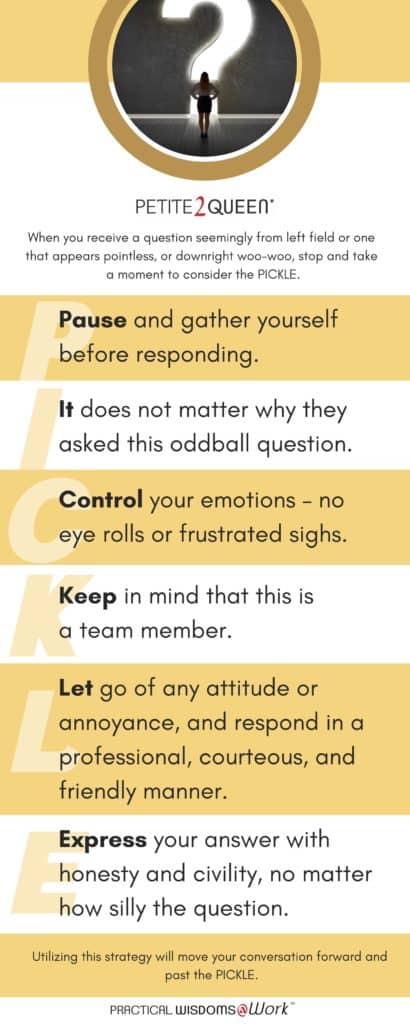My boss is wrong but thinks he’s right. How do I tackle this?
– Johnnita in Norfolk, VA
Answer:
Before you tackle this dilemma, you’ll first need to evaluate the situation. Is your boss actually wrong, or is it a matter of perspective? Let’s start by examining whether your boss is truly incorrect, or if there’s something you haven’t yet considered. Following that, if you find that your boss is indeed wrong, we’ll examine how you can address the issue.
There are a number of possibilities as to why you feel your boss is wrong. The circumstances that immediately come to mind are the following: information not shared, alternate viewpoint, or a different approach. Understanding the root cause of why you feel your boss is wrong will guide you to successfully navigate the situation.
Information Not Shared
Let’s start with the obvious: There may well be information you are not privy to. If you do not have the same big picture, facts, or data, it would be easy to form the conclusion that your boss is wrong. If you’ve seen The Last Jedi, you can connect with this scenario. Remember when Poe was sure Vice Admiral Holdo was wrong as they were chased by the New Order? As it turns out, he did not have all of the information and there was a shrewd strategy for escape.

Alternate Viewpoint
Your boss’s viewpoint is likely to have a unique foundation from yours. Key factors would include considering the impact of the decision on the team, department, and organization. Your boss may be receiving direction from his manager. The strategic purpose or outcome desired would directly influence your boss’s perspective. Think about how your frame of reference could be shaping your outlook that your boss is wrong.
Different Approach
At one point in my career, I had a completely different approach to a situation than my boss. I thought my boss’s method was wrong, but through the experience I learned that his path was not wrong, simply different. In fact, as we worked through the case, he adjusted his point of view to reach the conclusion I had originally voiced. His approach made the eventual transition smoother and painless for the entire team. Sometimes you need to take the long road around to travel a short distance.
Why Do You Think Your Boss is Wrong?
My advice is to examine your own “why.” Why do you think your boss is wrong? Run through each of the scenarios above and carefully consider if there is a block or obstacle to forming a balanced assessment. Acknowledge that your personal style could be a source of contrast or divergence in you and your boss’s attitude. Finally, ask yourself if this is a battle worth fighting.
If Your Boss Truly IS Wrong
If your boss is truly wrong, tread lightly. How you initiate the conversation is absolutely dependent upon the people involved and the unique situation. Adjust your approach based on the temperature of your relationship and aim to establish common ground.
Choose your words carefully. Your words, manner, and tone matter and should be positive. Avoid taking a defensive stance or displaying negative emotions. Instead, utilize the PICKLE strategy to manifest poise and grace during this difficult discussion. Always treat your boss with compassion and respect, and remember to see the good in your boss. He may be wrong, but he is another human being. In the end, your objective is to forge a stronger working relationship.

How to Tackle the Wrong: Managing Up
To truly tackle this issue like a pro, you’ll want to go about it with the aim of “managing up.”
When we get right into the core of this question, it’s about managing up. Managing up is a power skill which is a career-builder when used effectively. But there is also a dark shadow to managing up: If you do it poorly, it can negatively impact your position and career trajectory. Understanding what’s at stake and picking your spot is vital.
How to Manage Up
The first tip on managing up is owning your own responsibility and delivering high-level performance in everything you do. This goes hand-in-hand with your attitude. Another piece is recognizing there are alternate viewpoints, objectives, and processes to be considered. Don’t get lost in the weeds or fail to see the trees.
The second is to choose your time. Your very best approach is always in person. If that is impossible, make it a video call. Visual cues are crucial to your ability to read how the conversation is unfolding. The best way to approach your boss is definitely in private and after you’ve asked him for permission.

Rather than challenge his authority, the first step is to ask if he is open to explore and discuss the topic or question. Ask to meet for 2 minutes to help you understand the game plan so you can better align your work to the goals. Keep your idea concise and connected to the company goals, actively listen to your manager, and explore how you would be able to implement or address the topic in question. Answer the questions, then transition to what you would utilize and the path to get there.
If he says, “Not at this time,” ask if is there another time that’s going to work for him. Be flexible and back up gracefully if he is not interested and doesn’t want to talk about it. This is where you can get into dangerous territory. If your boss is completely closed to the conversation, you need to accept it. If another opportunity presents itself to reintroduce the topic, tread lightly and ask permission to revisit. Timing and circumstances change, so look for those spots.
Success
Experience is the key you want to walk away with. You want your boss to recognize that you are a dedicated team member who’s really looking out for the good of the company, team, and business. At the end, you’ll have built a stronger bridge with your boss.

Lynn Whitbeck is the co-founder and President of Petite2Queen. She is focused on identifying and evaluating opportunities for women at work, helping them define their personal roadmap. She dedicates herself to delivering tools and insights, embracing visualization of the big picture, and identifying and implementing the minutiae of detail. Lynn aims to share lessons learned along her journey and enable positive uplift for women.

